Bodies of Water

Shoog McDaniel’s photographs of queer life in rural Florida present a world where all bodies are sacred.
Shoog McDaniel: Cherub Dive, 2023
For a decade, photographer Shoog McDaniel has transformed how an anti-fat society views fat bodies—and how fat people view themselves. Their photographs lovingly embrace those who have been systematically excluded from the camera’s gaze: not only fat people but also members of queer, trans, disabled, and BIPOC (Black, Indigenous, people of color) communities, whose bodies Shoog often depicts in the nude as they joyfully commune with each other and Florida’s lush and threatened natural landscape.
Born and raised in Tallahassee, Florida, Shoog moved to West Philadelphia in 2007 where they organized community events for neighborhood kids from an abandoned and water-damaged row house turned queer and trans squat. But while Shoog thrived there, they longed to be closer to the cypress canopies, spring-fed rivers, and manatees they grew up with, so in 2010 they relocated back to Florida and began documenting friends in these landscapes. In December 2020, they bought the property that would become Hazy Acres—a burgeoning artist residency and respite that is situated on a six-acre swath of unceded Timucua, Mascogo, Seminole, and Miccosukee land in rural north-central Florida, amid the eight major freshwater springs that provide the region’s drinking water. With Hazy Acres, Shoog wants to provide a sanctuary for those who experience systematic barriers to accessing natural places, fostering an environment where creativity and movement-building bloom from communion with nature.
I first met Shoog in 2003 in a queer punk house in Lake Worth, Florida, while organizing for a major protest against the Fair Trade Agreement of the Americas in Miami. Though we’ve been friends for two decades, it was only in April 2022—just after Florida passed the “Don’t Say Gay” bill prohibiting instruction on sexual orientation and gender identity in schools—that I had a chance to collaborate with them. Shoog and I spent a week immersed in the queer communities flourishing amid the crystalline and otherworldly waters in and around Hazy Acres as I directed and filmed a portrait of Shoog titled How to Carry Water. The film’s opening scene—which features beautiful, queer, fat bodies that are completely nude—was set at a local spring. We knew this visibility carried the risk of harassment and violence, but together we managed to create a safe and joyful environment. Like Shoog’s creative practice and Hazy Acres itself, the film addresses what is lacking by celebrating what exists and actively creating what is possible.
In a state with a long legacy of anti-LGBTQ and anti-Black oppression, Shoog’s process of bringing people into relation with their bodies, each other, and the land acknowledges the grief of erasure, extraction, and loss of habitat, while also giving us a glimpse of the utopian possibilities of a world where all bodies are sacred. I spoke to Shoog about queer life in rural Florida, the relationship between fat bodies and the natural world, and what they are holding onto through a difficult political moment. This conversation has been edited for length and clarity.

Shoog McDaniel in a still from Sasha Wortzel’s How to Carry Water, 2023. Courtesy of Multitude Films.
Sasha Wortzel: There’s always been hatred and oppression in Florida. And yet we’re also in a particularly heightened moment of repression, with anti-trans legislation, the “Don’t Say Gay” bill, the erasure of Black history from school textbooks, as well as attacks on bodily autonomy and reproductive justice. How do you cope with all of this?
Shoog McDaniel: One of the main ways that I manage is through my community. There’s a group of people in Gainesville who have been putting on these outdoor queer dance parties. I’m 43 years old; I’m not the typical age to go out to a dance party, but I go to every single one. Why? Because it is important for me to feel like I can be happy and gay in public in a moment when the oppression is really coming down hard. So my Florida queer community is how I come together with folks to feel safe, even as there’s often reasons to believe that we’re in danger.
There’s still a lot of fear involved in creating these spaces. We saw the Pulse nightclub shooting in Orlando; we saw someone shoot up a queer party in Baltimore. Things like that are always in the back of my mind, and remind me that having any kind of visible event means that there’s potential for violence. That is scary as hell. But people are still willing to come out in the face of that fear and continue the queer legacy of joy-making.
SW: Your photography embodies this so well. It shows us a different Florida than both beach resorts and repressive politics: one where rural landscapes and interior freshwater springs are populated by joyful BIPOC, trans, queer, fat, and disabled bodies. You’re transmitting expansive and beautiful images of incredibly threatened landscapes and people who are so integral to the fabric of Florida but are often not seen. Why is it important to you to do this work in rural areas?
SM: Even people who live here in Florida are very wary of being in rural spaces because of their association with rednecks and lawlessness and queer-bashing white supremacists. I used to be like that, but at some point I realized that I didn’t want to be scared anymore. When we’re all together in rural areas and laughing and experiencing joy, we can create a force field around us.
SW: From talking to you, I know that you made a very intentional choice to stay in Florida long before this particular moment. Yet queer Floridians who choose to stay sometimes receive a lot of judgment about that choice. What does it mean to stay? What are you staying for and with?
“The ecology here is so gay—the land so clearly wants me here. And I feel like it’s my responsibility to do what I can to protect it.”
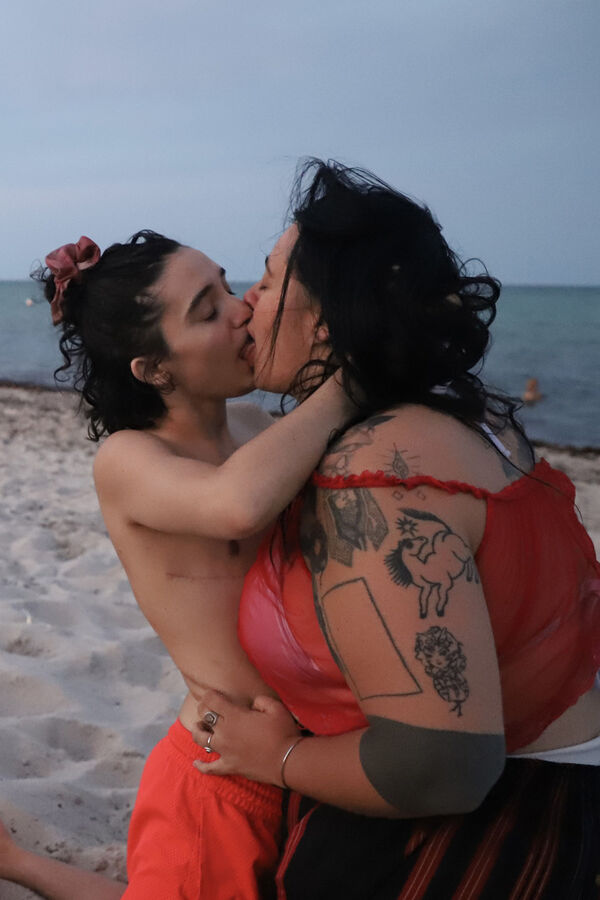
Kiss at Sunset, 2023
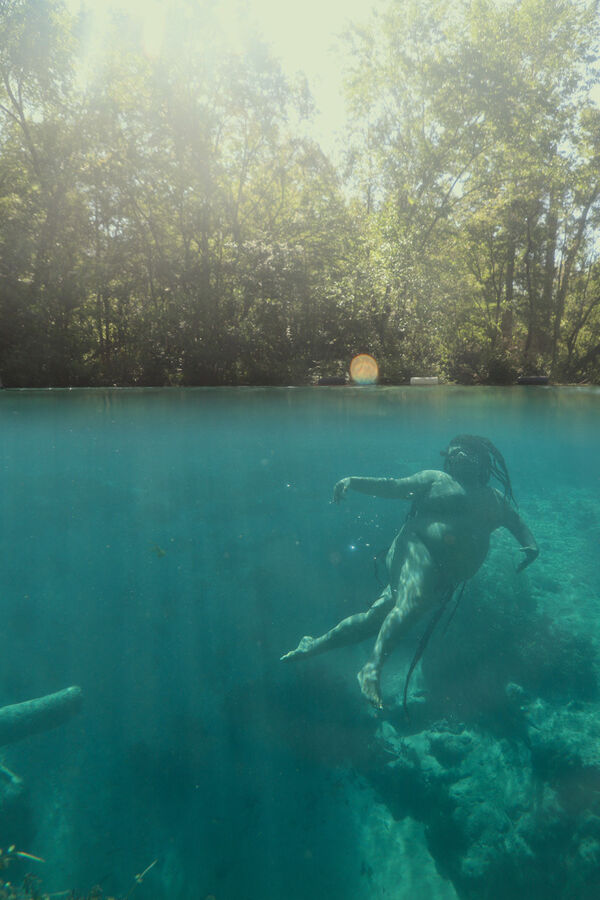
Matias Dances, 2021
SM: I get that not everybody has the choice to move away. Young trans kids who live with their families can’t leave, nor can queer folks without the economic means. But for me, it is a choice, and I choose to stay. I decided this in part because I’m very connected to the natural world in Florida: the animals, the plants. It’s one of the most biodiverse places in the United States. The ecology here is so gay—I can’t really explain it, but the water holds me, and the wind whispers to me, and the moss is soft under my feet. The land so clearly wants me here. I feel really taken care of by the environment, and feel like it’s my responsibility to do what I can to protect it.
Many people do not understand the fullness of Florida. They categorize it as one thing. And when you categorize it as one thing, guess what? You can ignore it, and write it off and say, it’s too far gone. When I’m out in the world, and I hear people talking shit about Florida, I invite them to come down. I can show you the spring run. I can show you some beautiful things. I want people to know Florida. I want people to understand why this place is important to me and why I choose to stay.
SW: I have a different relationship to Florida. Like you, I was born and raised here, but as a young person, I struggled to envision a joyful future for myself here, so I moved to New York as an adult. But I’ve always kept one foot in Florida. It’s a fluid relationship where I come and go, flow in and out with the tides. Florida always calls me back, and shows up in my creative work.
SM: It makes sense because you grew up in Fort Myers and Sanibel—this liminal barrier island—that could be, and unfortunately was, desecrated in a heartbeat. In the back of your mind, you know that Florida is sinking into the ocean, and that you have been living on the very edge of it. I think you’re smart to have made sure to establish yourself in other places, too, because like we found out with Hurricane Ian in 2022 that shit is real.
SW: It’s been a really uncertain and precarious time. A lot of the things that have anchored me and been critical to my understanding of myself in the world are shifting, mainly through human-accelerated climate collapse. I understand and have been processing for some time the idea that much of the place we call home will be underwater in our lifetime. Yet nothing prepared me for a nearly Category Five storm to hit and completely devastate the area I’m from.
Many of us share this experience in the world right now. There are many reasons to feel unmoored, untethered, and adrift. There’s not just ecological devastation but also the current political climate in Florida—worsening infringement on Indigenous sovereignty, transphobia—which is really just reflective of the larger project of the United States.
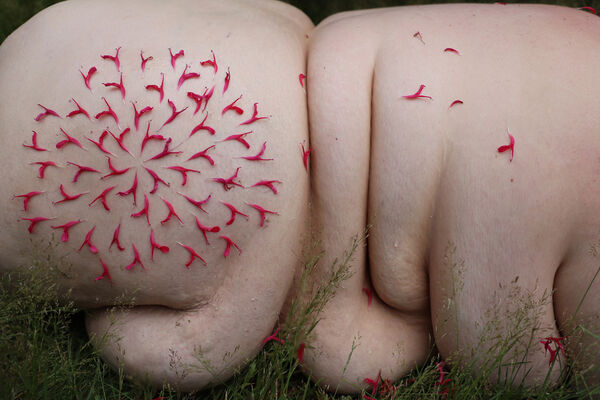
Flower Burst, 2018
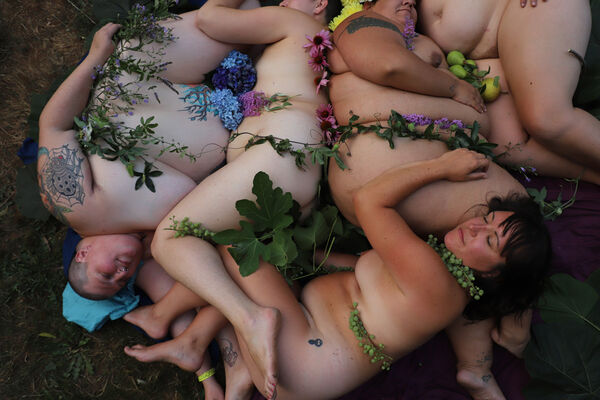
Flower Puddle, 2018
SM: It’s true, there’s a push and pull between the wild beauty of Florida and its repressive politics. But that’s not all it is.
SW: Exactly. In the American imagination, Florida has been a place that is both reviled and desired, a screen on which to project all our desires and fears. Florida is thought of as a site of leisure, pleasure, sunshine, beaches, theme parks, and also as a wasteland, backwards, a joke. This is a place that doesn’t easily fit into tidy binaries. I really embrace that idea of Florida’s unruliness, especially as a queer artist.
SM: Totally. Because Florida is written off as this wild place, there’s a way in which that gives me freedom to be wild. Like, we’re gonna be wild as hell and do wild things. And then you’re gonna be like, Wow, Florida is cool. You know? I just feel like all the stuff happening here only encourages me to be strong and continue to make good art. I think there’s a resiliency that comes with not ever knowing what’s going to be thrown at us next, just like the resiliency of nature here.
SW: I want to talk about the relationship between bodies and nature in your work. The lands and waters now known as the state of Florida have been under a series of attacks, reengineered to fit the desires of those in power. Wetlands in particular have been viewed as evil, and in need of improvement in order to have a purpose under capitalism. And I think we can see a parallel in our relationship with the way that many bodies—particularly queer, trans, BIPOC, disabled bodies—are treated in Florida, as though they need to be changed or eradicated altogether.
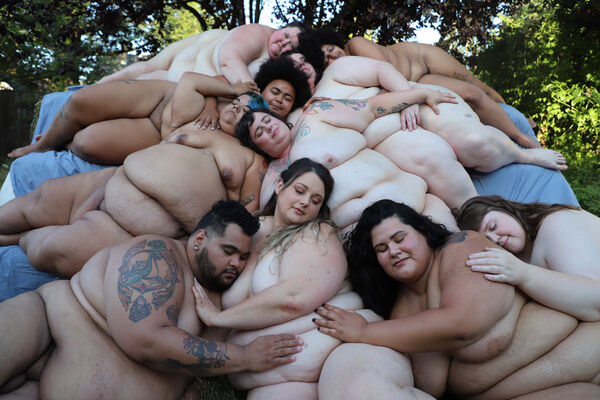
Fatty Mountain, 2018
SM: Bodies of water and fat bodies have so many similarities to me: The things that are enacted upon Florida’s natural landscapes also happen to fat bodies, disabled bodies. Developers and corporations build dams, drain wetlands, siphon water for bottling and profit. Fat bodies are similarly told they must change to fit socially acceptable standards. People who are just trying to exist and have a happy moment or two in their lives are told that they’re wrong, and that if they stay what they are they can’t be worthy of care, love, or joy. That’s why almost all of my photography is based in natural environments. And in it, I want to bring out the parallel not only of the pressures, but also of how beautiful it is to see Florida in its natural state and bodies in their natural state—without the gaze of the oppressor.
SW: I’m looking at a photograph of yours where a body is suspended weightless over the opening of a spring vent: the point in a freshwater spring where all this ancient water is gushing up from deep within the earth, where past and present meet. The force of that water creates a kind of current, a force you can feel. And in this image, there are also these beautiful, soft, effervescent bubbles. Could you talk more about the experience of working with people in these sacred spaces?
SM: In Florida, there’s an unending supply of exquisite things to see and to photograph: the beaches, the wetlands, the pine barrens. Even within a single swamp, you find beautiful formations, different trees and roots and the cypress knees growing up around us, and we can get tangled up in them with our bodies. It’s a fast-changing, dynamic environment. You go to a spring one day, and there’ll be a manatee in it, and then you go the next day, and there’s a whole bunch of fish. Sometimes algae has taken over the spring; that makes for wonderful images, even if it’s bad for the spring, and sometimes means the imagery is sad. And the buoyancy in water that I feel as a fat person is so incredible. It’s like a blessing because I’m able to float above the people that I’m photographing and use minimal physical effort to capture my shots. It makes me feel loved and supported by the springs. The spring is working with me.
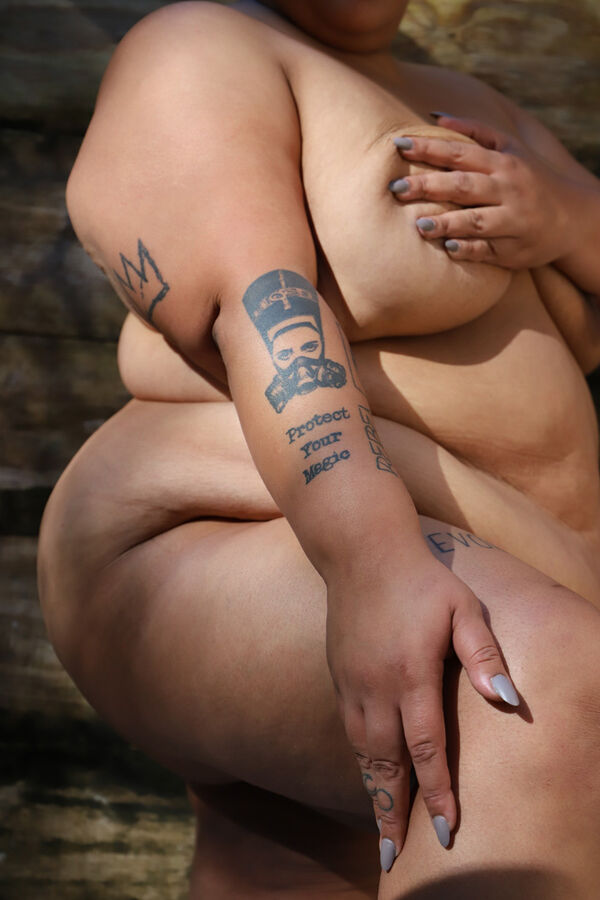
Protect Your Magic, 2017
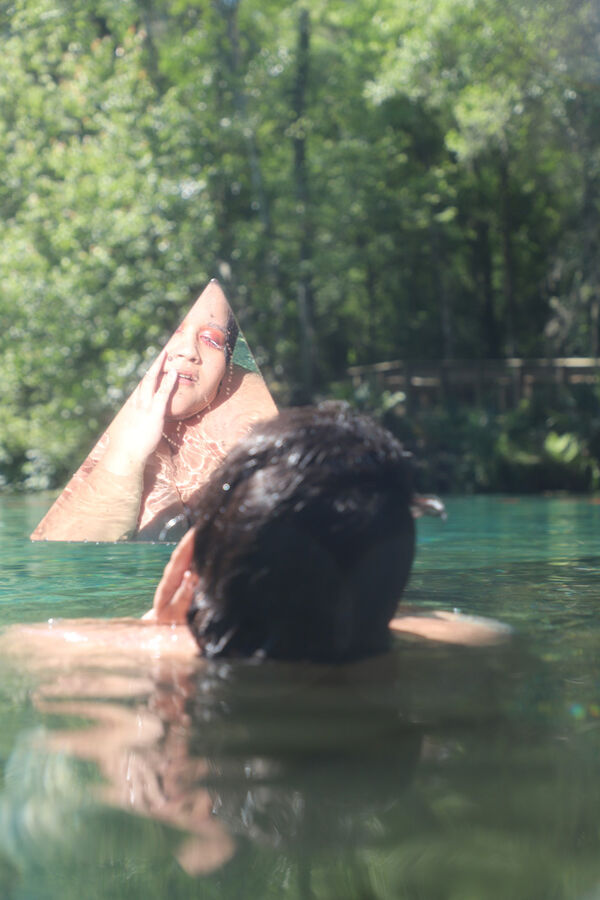
Melba in Mirror, 2022
SW: And yet the springs are drying up from overextraction by water-bottling companies; the sacred tree islands of the Everglades are disappearing from mismanagement of the water system; the Gulf coastline of my hometown is experiencing more intense and longer toxic algal blooms that cover the beaches in tons of dead sea life; and manatees are starving to death because the seagrass has died off.
Still, amid this violence and grief, there’s abundance, life, and resistance. There was an incredible wading bird season in the Everglades last year, and a record number of manatees gathered at Blue Spring State Park this winter. Florida is a place of all these paradoxes and contradictions and that’s one of the things I’m really moved by in your work. We both share a commitment to engaging with the heartbreak, while also really highlighting what else is being made outside a system that has deemed a swamp, or a fat body, or a trans body unworthy of love and care.
SM: That’s really well said. I think the only way I can live here is by having hope, which is such a rare commodity these days, so hard to come by when living in places that are under attack. But I’ve lived through enough change to know that Florida is only going to continue changing. That’s just how life is. My dream and hope is that as things shift, we can recognize and honor the sanctity of what we have, and what we’re losing. And hopefully, in the process of change, we can shift toward acceptance and love. That’s really the goal for me.
Sasha Wortzel is an artist and filmmaker working between New York and Florida. Wortzel is a 2023 Guggenheim fellow and has received support from Sundance Institute, Ford Foundation, and a MacDowell fellowship.

